Top 15 Ubersuggest Alternatives & Competitors in 2024

Neil Patel’s Ubersuggest platform brings practical SEO tools to marketers looking to boost their digital visibility. The software combines essential features like keyword research and competitive analysis with straightforward site auditing capabilities. Most teams use it to track website performance metrics and spot new traffic opportunities, while appreciating its clean, straightforward dashboard.
Ubersuggest has found its place among SEO tools by keeping things simple and cost-effective. Small business owners and marketing teams often need reliable data without premium price tags or complex interfaces. The platform delivers current search insights and ranking data that helps brands adapt to algorithm shifts and stay competitive. Many growing companies have used it to move from page 2 obscurity to consistent page 1 rankings.
While Ubersuggest is a great product, it’s always good to shop around and look for alternatives. This article identifies some top competitors and their pros and cons.
SEMrush
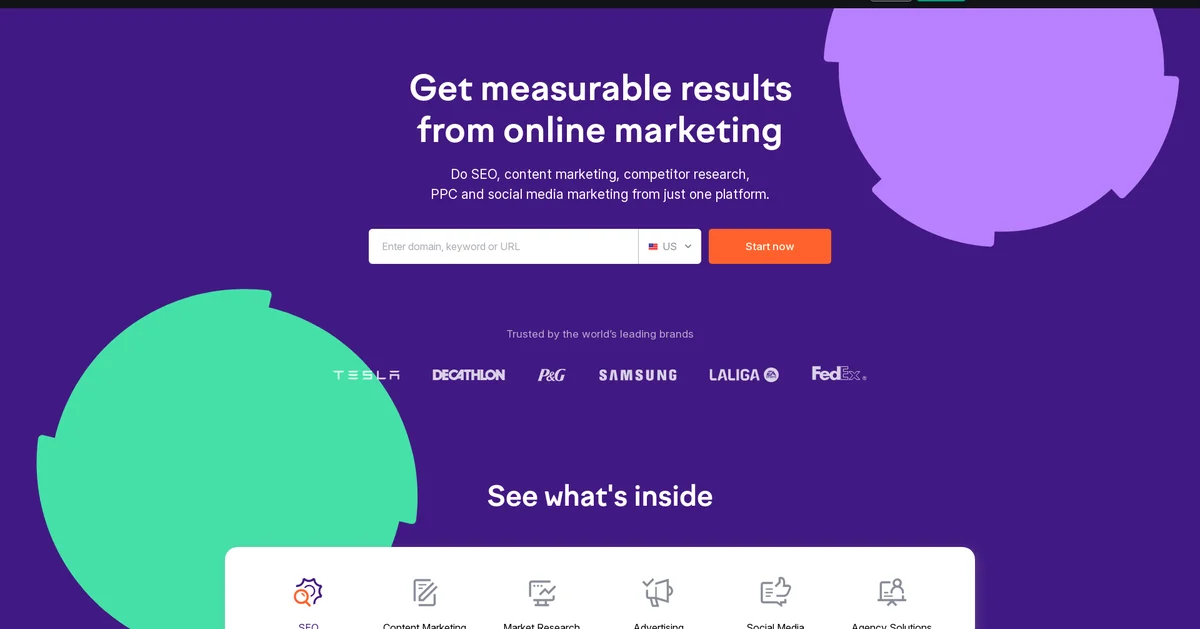
SEMrush has earned its reputation as a powerhouse among SEO platforms by offering comprehensive marketing capabilities. Unlike Ubersuggest’s more streamlined focus on keyword research, SEMrush delivers broader functionality that appeals to marketing teams needing deeper analytical insights.
The platform emerged from a clear market need for consolidated marketing tools. SEMrush now delivers everything from SEO and content optimization to competitive analysis and paid advertising management. Marketing teams can tap into a massive database spanning 26 billion keywords across 130 countries. The competitive analysis features reveal valuable traffic patterns and strategic insights from other websites in any given industry, helping shape more effective marketing approaches.
Technical SEO remains a core strength of the platform. Teams can run comprehensive site audits examining over 130 technical elements, with clear guidance for improving performance metrics. The platform stretches beyond basic optimization into content strategy, paid advertising, and social media management - though each component maintains practical utility rather than trying to do everything. These integrated tools help marketing departments streamline their workflows across multiple channels.
Many enterprise companies rely on SEMrush for their digital marketing operations, as showed by its widespread adoption among Fortune 500 brands. The platform emphasizes actionable analytics that connect directly to bottom-line marketing results.
Pros
- Extensive toolkit covering SEO, content, advertising and social media needs
- Strong competitive intelligence capabilities
- Deep keyword research and tracking functionality
- Daily SERP position monitoring
- Established track record with major brands
Cons
- Complex interface requires time to master
- Premium pricing compared to basic tools
- Feature set can overwhelm new users
Ahrefs
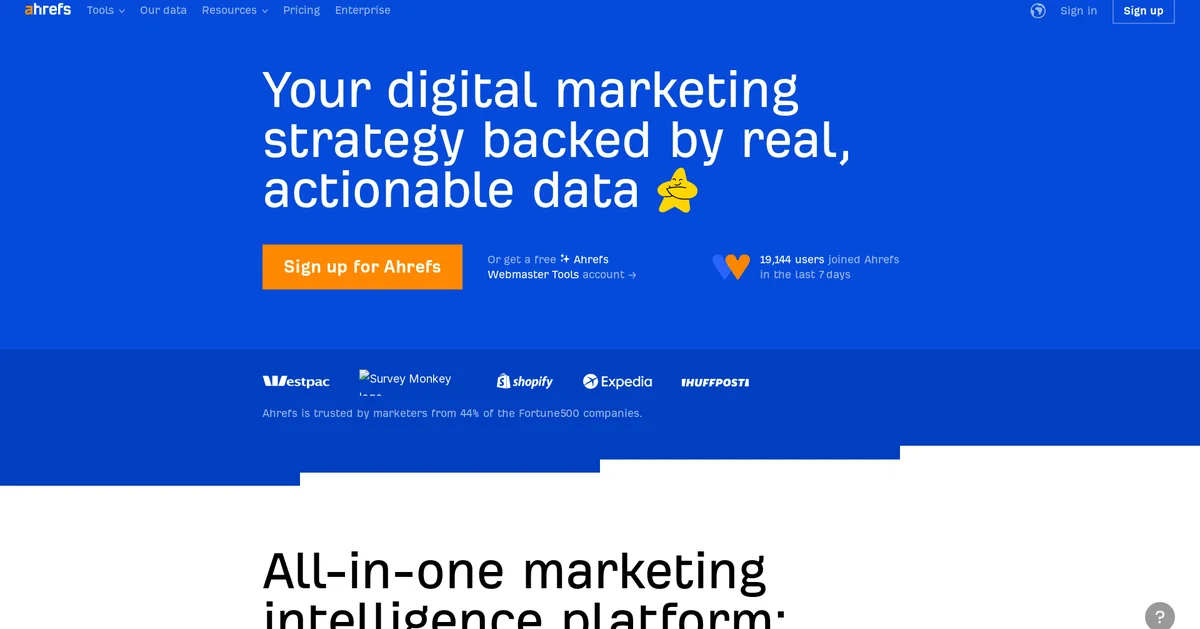
Ahrefs started as a simple backlink checker in 2011 but has grown into one of the most powerful SEO platforms available. The tool now covers everything from competitor research to technical site audits, making it popular among digital marketers who need deep insights. While many know Ahrefs for its backlink analysis, the platform has expanded to include sophisticated keyword research, content planning, and rank tracking capabilities.
Behind Ahrefs’ effectiveness lies its massive web crawling infrastructure. The platform processes and stores petabytes of data, giving users access to detailed insights about websites, backlinks, and search rankings. Their commitment to data quality shows in their development of a custom search engine, which helps them better understand and interpret search patterns and algorithms.
The platform goes beyond just providing tools - it nurtures a thriving marketing community. Through detailed tutorials, webinars, and an active user forum, marketers can develop their skills while connecting with peers. This educational approach helps users better their investment and stay current with SEO best practices.
When compared to simpler tools like Ubersuggest, Ahrefs delivers more comprehensive data and advanced functionality for serious SEO professionals.
Pros
- Full suite of professional SEO tools
- Industry-leading data accuracy
- Active learning community
- Clean, intuitive dashboard
Cons
- Premium pricing structure
- Complex features take time to master
Moz
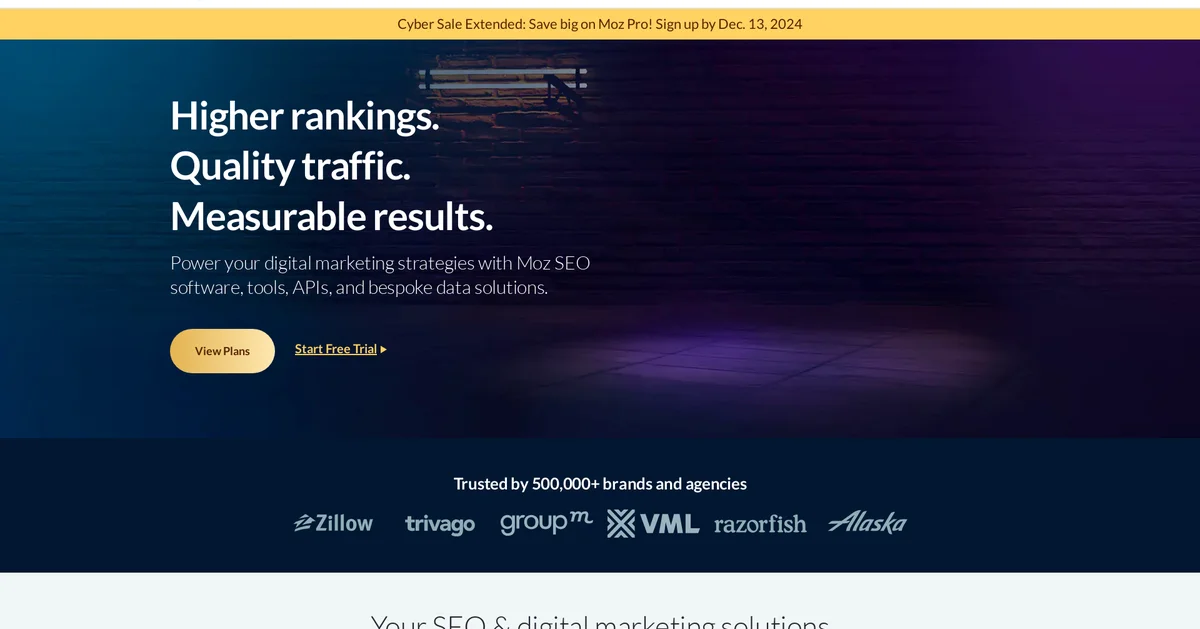
Moz emerged as a key player in SEO software back in 2004, growing to support hundreds of thousands of marketing teams worldwide. The platform earned its reputation through robust analytics and practical tools that deliver real traffic growth. Moz Pro became the company’s flagship product, giving marketing teams the essential tools to boost search rankings and measure campaign success. Their keyword research capabilities stand out, helping teams spot valuable search terms that convert.
While Ubersuggest takes a more basic approach to keywords and analysis, Moz offers deeper competitive intelligence and market positioning data. Teams can track SERP movements and benchmark against competitors with detailed metrics. For developers and larger organizations, the Moz API enables custom integrations to pull SEO data directly into existing workflows and reporting systems.
The platform also includes Moz Local, which tackles the specific challenges of location-based marketing and review management. This tool helps multi-location businesses maintain accurate listings and respond to customer feedback across platforms. Local SEO requires different tactics than general optimization, addressing needs that simpler tools often miss.
Behind the technology, Moz built its brand on practical education and peer support in the SEO community. Their learning resources help marketers develop real skills through hands-on practice. Marketing teams rely on Moz’s data-driven approach to justify budgets and prove ROI on their optimization efforts.
Pros
- Full-featured SEO platform covering essential optimization needs
- Detailed competitor tracking and market analysis tools
- Specialized local business optimization capabilities
- Active learning community with practical resources
Cons
- Interface requires time to navigate effectively
- New users face initial learning challenges
- Premium pricing may stretch smaller budgets
SpyFu
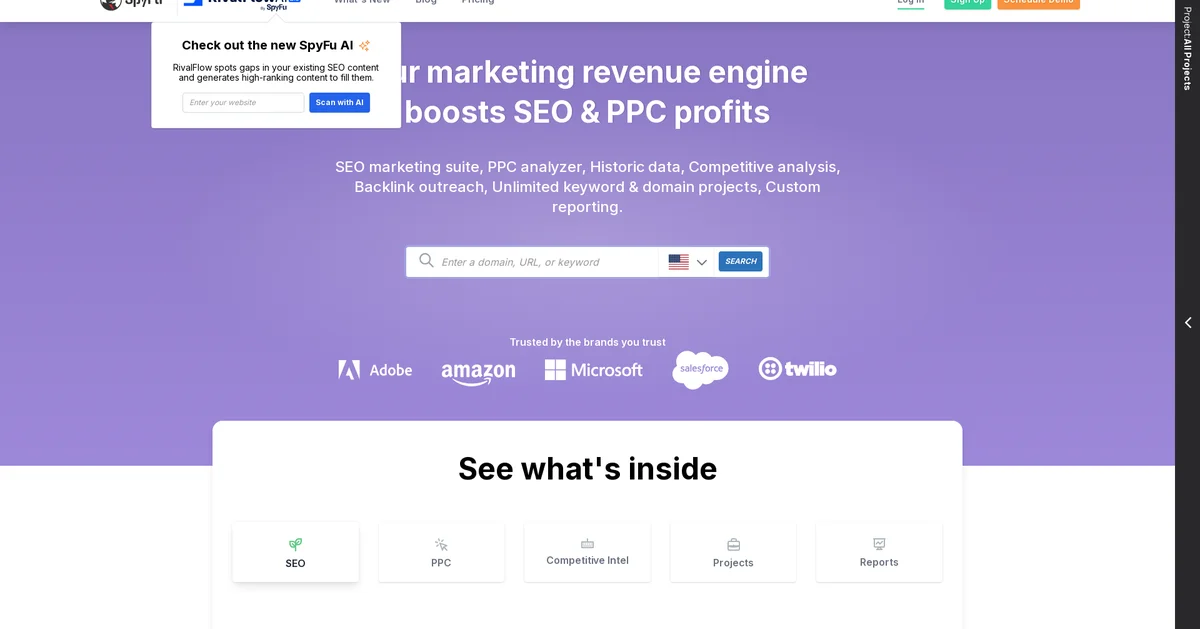
SpyFu has carved out a solid reputation in the SEO and PPC software landscape. The platform started with a straightforward mission to decode competitor strategies and has evolved into a robust toolkit that delivers detailed insights about how other businesses perform online.
A standout aspect of SpyFu is the extensive historical data tracking, spanning back 14 years of domain rankings and backlink patterns. This wealth of information enables marketing teams to spot successful patterns in competitor strategies and adapt them effectively. Beyond SEO capabilities, the platform shines in PPC analysis by uncovering competitor ad approaches, keyword selection, and spend levels. The Google Ads Advisor feature strengthens campaign performance through historical ad analysis, negative keyword suggestions, and data-driven recommendations.
The competitive analysis capabilities form the backbone of SpyFu’s offering. Marketing teams can monitor multiple competitors, run side-by-side domain comparisons, and receive real-time updates through customizable alerts. This functionality streamlines the process of identifying key market players and spotting content opportunities with ranking potential. The recent addition of RivalFlow, an AI-powered feature, demonstrates SpyFu’s innovative approach by automatically suggesting content topics based on market gaps.
Pros:
- Historical data spanning 14 years
- Comprehensive competitor tracking for SEO and PPC
- AI-improved content opportunity finder
- Flexible reporting and alert system
Cons:
- Steep learning curve for new users
- Premium pricing structure
Mangools
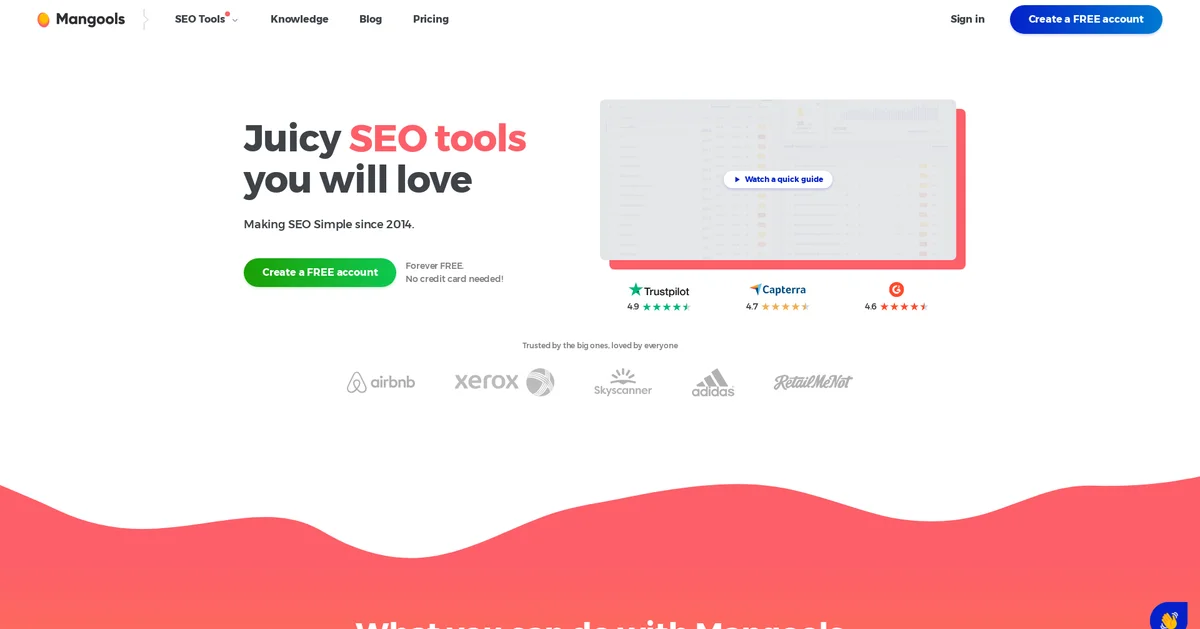
Mangools entered the SEO tools market back in 2014, bringing a straightforward approach to search engine optimization. The platform strips away unnecessary complexity with a clean, practical interface that works well for both newcomers and experienced SEO professionals - making it a solid alternative to tools like Ubersuggest.
The platform shines with its keyword difficulty scoring system, giving users practical insights into ranking potential for specific search terms. Their performance tracking helps monitor search result positions effectively, while the Link Strength metric cuts through the noise to identify truly valuable backlink opportunities.
What sets Mangools apart is their hands-on support network. The support team consists of actual SEO practitioners who bring real-world experience to problem-solving. Starting at $29 monthly, the platform delivers core SEO functionality at a reasonable price point, though it doesn’t try to match the full feature set of comprehensive solutions like Ubersuggest.
For businesses seeking essential SEO capabilities without excessive bells and whistles, Mangools delivers a balanced mix of usability and practical features that serve both beginning and seasoned marketers.
Pros
- Clean, straightforward interface design
- Reliable keyword analysis and rank tracking
- Support team with hands-on SEO expertise
- Budget-friendly pricing structure
Cons
- More limited feature set than enterprise platforms
- Minimal integration options with external tools
Serpstat
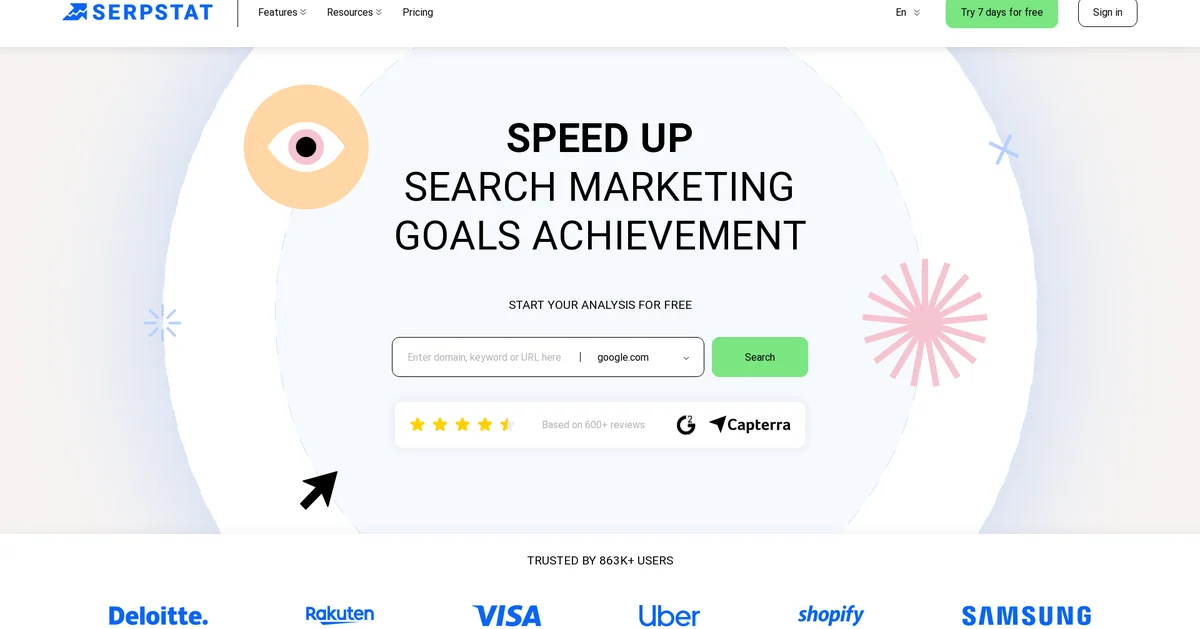
Serpstat delivers comprehensive SEO capabilities that make it a viable alternative to Ubersuggest. The platform combines robust keyword research, competitive analysis, site auditing and rank tracking functionality to help streamline SEO workflow. For marketing teams seeking detailed insights without premium pricing, Serpstat offers an attractive balance of features and affordability.
The competitive analysis capabilities really set Serpstat apart. Marketing teams can identify true search competitors, examine their traffic patterns and backlink profiles, and uncover the specific keywords driving their success. This competitive intelligence proves invaluable for strategic planning. With keyword data spanning 230 countries and both paid/organic search tracking, Serpstat equips users to compete effectively across diverse markets.
The platform earns high marks for its straightforward interface and clear documentation. Users consistently note how quickly they can access and interpret key data points. For organizations looking to reduce agency dependencies, Serpstat provides specific optimization recommendations and technical guidance. The site audit functionality excels at surfacing and explaining SEO issues that impact performance.
Cost accessibility remains a core focus, with many premium features available to test drive during the trial period. This approach enables marketing teams to validate the platform’s value before making a significant financial commitment.
Pros
- Robust competitive intelligence capabilities
- Extensive global keyword coverage
- Clean, intuitive interface
- Comprehensive site auditing
- Risk-free trial access
Cons
- Steeper learning curve for SEO newcomers
- Select features lack depth vs enterprise alternatives
- More limited tool integration options
Raven Tools
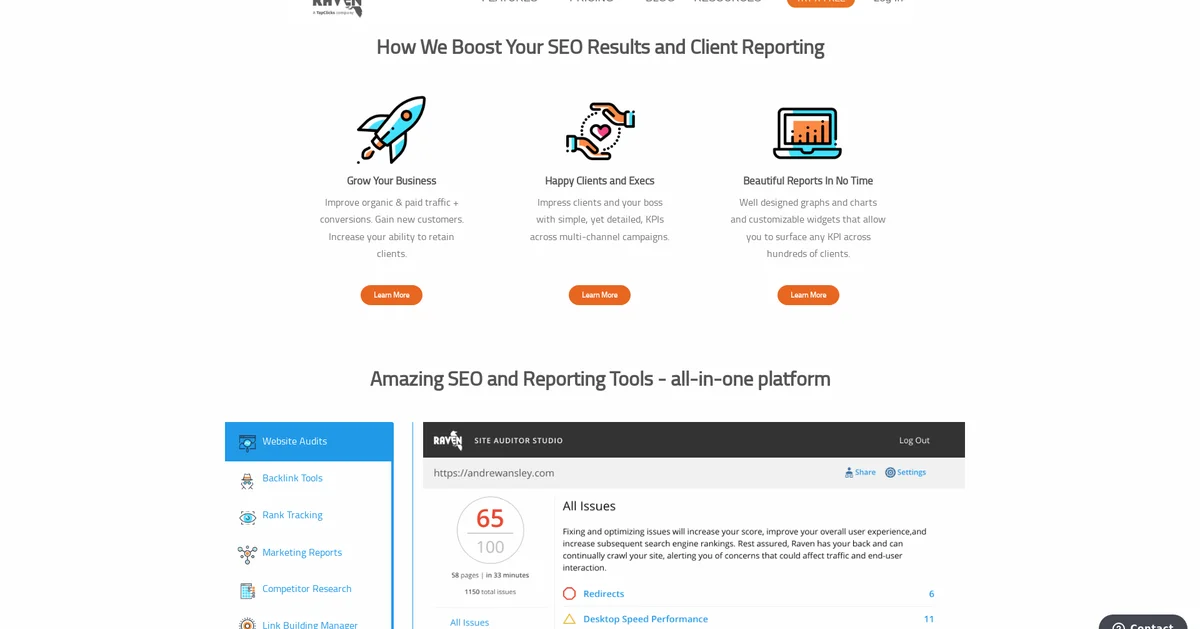
Raven Tools stands out as a robust SEO and reporting platform that tackles both online visibility and client reporting needs. While it shares some DNA with Ubersuggest in helping businesses boost organic and paid traffic, Raven Tools carves its own path through specialized features and consolidated marketing analytics.
The platform’s Site Auditor tool does the heavy lifting when it comes to SEO health checks, scanning both desktop and mobile versions of websites. Each scan generates a thorough report with a clear health score, making it simple to spot and rank problems based on their impact. The ability to share these findings directly with team members or clients streamlines the whole process of fixing SEO issues.
When it comes to backlinks, Raven Tools packs a punch. The platform lets users dig through up to 50,000 backlinks per URL, with data pulled from Majestic to sort links by authority and type. This depth of information proves especially valuable when sizing up competitors or cleaning up a link profile.
The rank tracking capabilities show real attention to detail, letting users fine-tune tracking frequency and location settings. Teams can monitor keyword performance across different search engines and devices, building up valuable historical data along the way.
The reporting system really shines in day-to-day operations, featuring intuitive drag-and-drop tools that cut report creation time dramatically. Marketing teams particularly value the unlimited report generation and automated scheduling options.
Pros
- Thorough website auditing capabilities
- Rich backlink intelligence
- Flexible rank monitoring options
- Streamlined report creation
Cons
- Interface can overwhelm new users
- Takes more time to master than Ubersuggest
Majestic
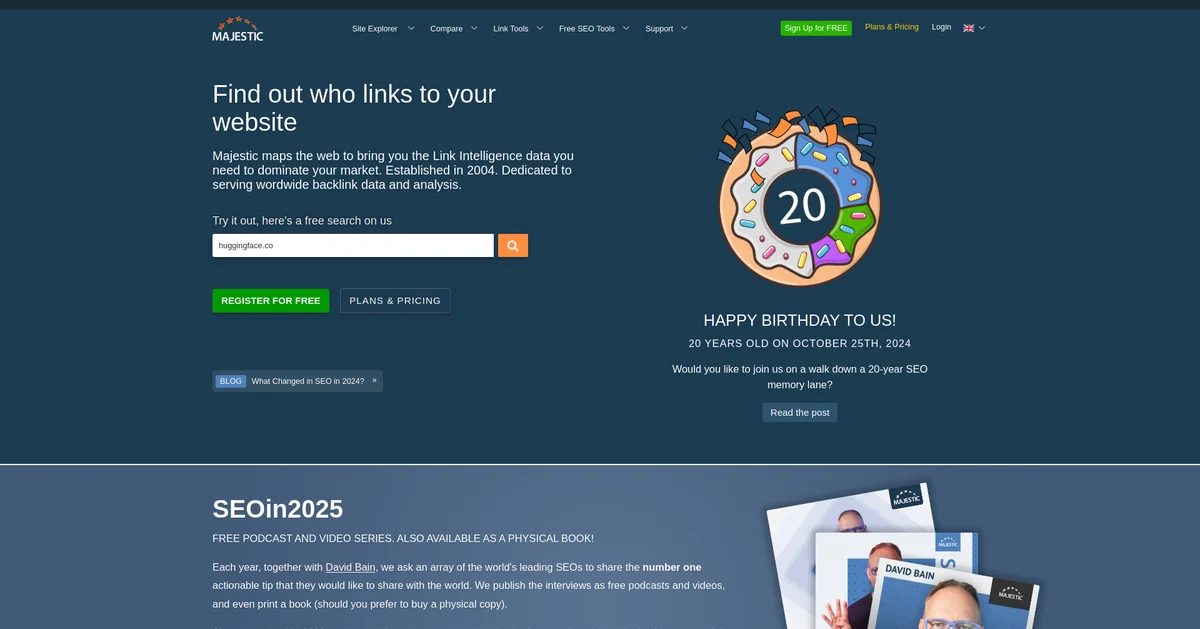
Majestic stands as a veteran in the SEO tools market, with nearly two decades of experience in backlink analysis and link intelligence. Since 2004, they’ve carved out their niche by providing detailed data for businesses looking to strengthen their digital footprint. The platform centers on two key measurements: Trust Flow and Citation Flow. These metrics work together to show both the quality and quantity of incoming links, giving users a clear picture of their site’s link profile.
The Author Explorer sets Majestic apart from typical SEO platforms. Rather than just tracking websites, this feature digs into the people creating content across the web, making relationship-building more strategic and personal. Their dual-index system captures both recent changes and long-term patterns in backlink profiles, offering users a complete view of their link landscape.
The platform’s specialized tools include Visibility Flow for spotting editorial opportunities and Topical Trust Flow for measuring domain authority within specific industries. Their robust API has made them particularly valuable to agencies and technical teams who need to process large amounts of link data for custom projects.
Majestic knows its strengths and sticks to them, focusing on deep link analysis rather than trying to be everything to everyone. This specialized approach makes it particularly valuable for businesses that need sophisticated link intelligence to drive their SEO efforts.
Pros
- Distinctive metrics for evaluating link quality
- Detailed author tracking capabilities
- Comprehensive historical and current link data
- Developer-friendly API infrastructure
Cons
- Steep learning curve for new users
- More limited SEO toolkit compared to Ubersuggest
- Specialized focus might not match broader marketing needs
CognitiveSEO
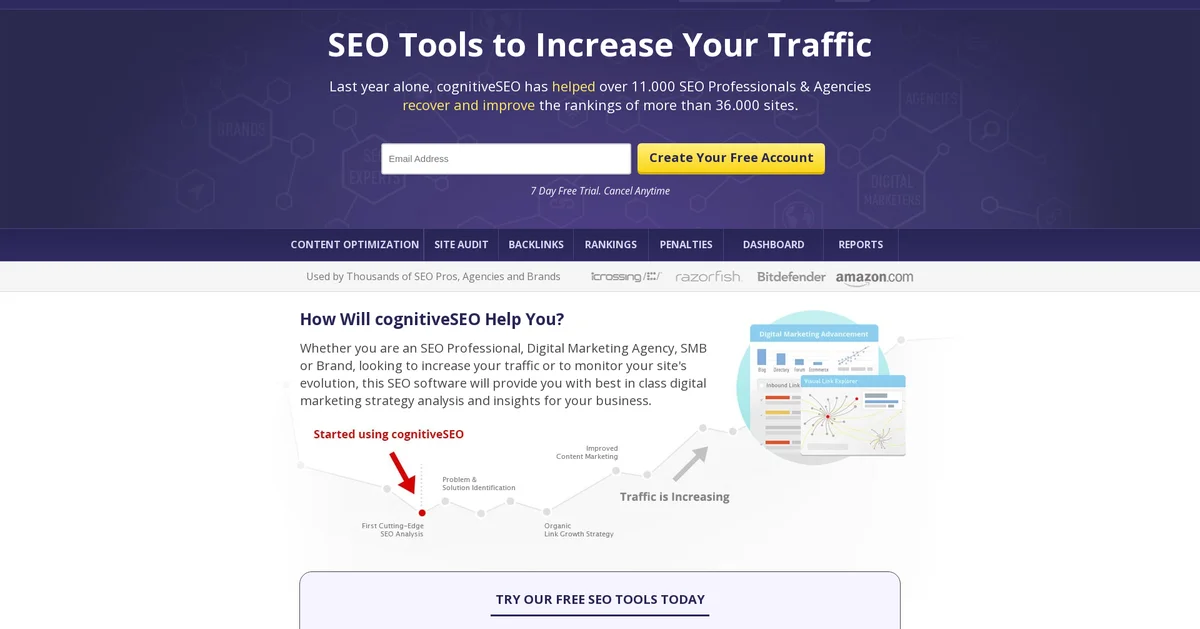
CognitiveSEO stands out among SEO platforms with its advanced analysis capabilities and depth of features. The platform serves SEO professionals and marketing teams who need detailed insights beyond basic keyword tracking. While tools like Ubersuggest focus mainly on keyword research, CognitiveSEO delivers comprehensive data across multiple SEO dimensions.
The content optimization system represents some of CognitiveSEO’s most valuable functionality. By analyzing content performance through AI and natural language processing, the platform reveals which specific elements affect Google rankings. Users gain clear direction on content adjustments that can boost their position in search results.
The site audit function sets this platform apart from basic SEO tools. Regular scans catch technical issues early, helping teams maintain consistent traffic and prevent major ranking drops. The backlink analysis provides crucial insights into link profiles while identifying potentially harmful connections that could damage rankings.
For sites dealing with Google penalties, CognitiveSEO includes specialized recovery tools. These features help diagnose the root causes of penalties and create targeted plans to restore rankings.
The platform delivers practical solutions for both routine optimization work and more complex SEO challenges like penalty recovery and technical audits.
Pros
- Full-featured SEO toolkit
- Smart content optimization engine
- Thorough technical site auditing
- Complete backlink monitoring system
Cons
- Steeper complexity than basic tools
- Takes time to master all features
- Premium pricing may challenge smaller teams
Screaming Frog
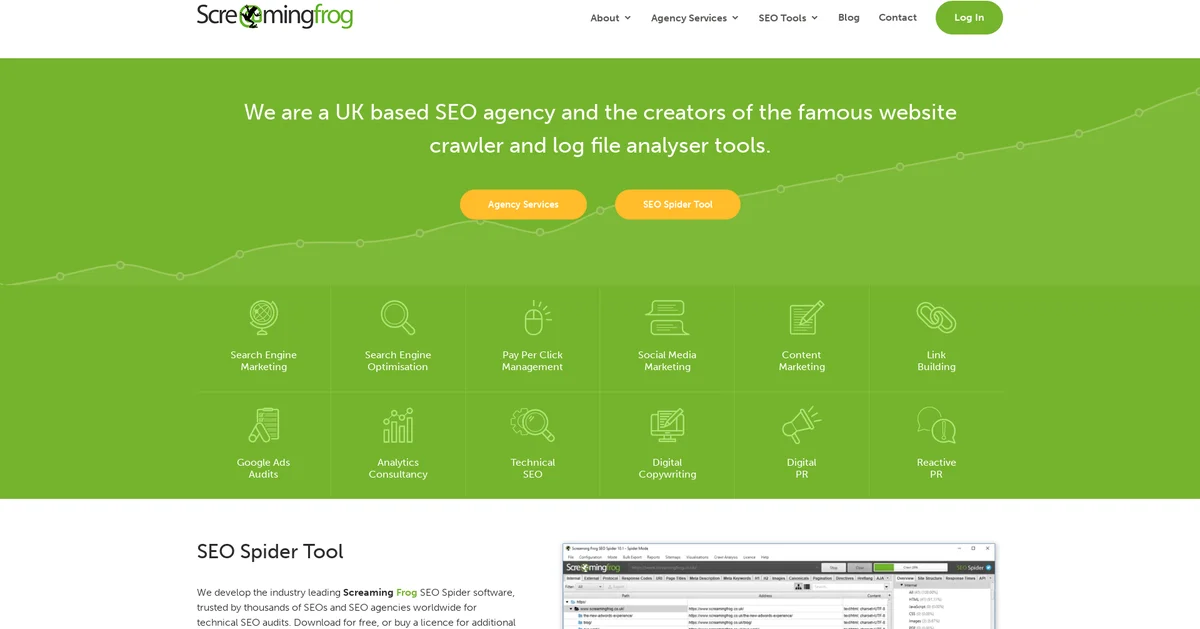
Based in the UK, Screaming Frog has made its mark in the SEO industry with their powerful SEO Spider Tool. The company started as a group of SEO specialists who saw gaps in existing website crawling solutions. Today, their tools serve major corporations and growing businesses alike, bringing technical precision to search optimization strategies.
The SEO Spider Tool stands as their flagship product, enabling detailed technical website audits. Teams use it to extract crucial site data, from meta descriptions to server response codes, making it essential for maintaining website health. While tools like Ubersuggest excel at keyword planning, Screaming Frog specializes in identifying technical barriers that often go unnoticed yet significantly impact search rankings.
Professional SEO teams have accepted Screaming Frog’s toolkit, particularly valuing its robust capabilities. Beyond software offerings, the company provides specialized consulting services, positioning themselves as both a technology provider and strategic partner. This dual approach sets them apart from standard SEO software vendors.
For organizations prioritizing technical SEO excellence and comprehensive site analysis, Screaming Frog delivers proven results backed by years of industry experience.
Pros
- Deep technical analysis capabilities
- Robust crawling technology
- Flexible service options
- Strong user community support
Cons
- Limited keyword research functionality
- Premium features require subscription
- Complex interface for beginners
SE Ranking
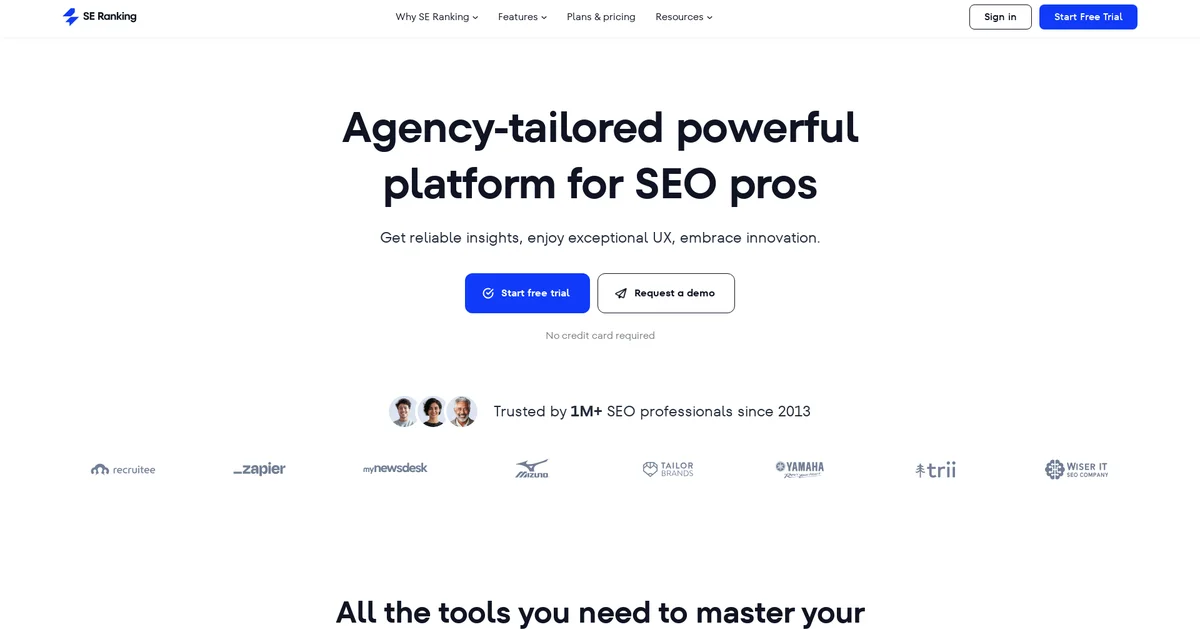
SE Ranking emerged in 2013 as a robust competitor to Ubersuggest, carving out its niche in the crowded SEO software market. Built with agencies in mind, the platform delivers comprehensive SEO capabilities that simplify complex workflows. The tool has steadily grown its user base to over a million professionals who rely on its data-driven insights and straightforward dashboard.
The platform stands out by unifying essential SEO functions - from keyword discovery and competitor tracking to backlink monitoring and technical audits - into a single cohesive system. This consolidated approach helps teams develop targeted strategies without jumping between multiple tools. SE Ranking processes vast amounts of data through advanced algorithms, delivering practical recommendations that drive real results.
The agency-centric focus really shines through SE Ranking’s white-label capabilities. Marketing firms can fully customize the interface with their own branding, adding a professional touch to client deliverables. Small businesses benefit from local SEO features that boost visibility in their target markets and help capture nearby customers searching for their services.
The development team actively incorporates user suggestions into regular platform updates, ensuring the tool evolves alongside changing SEO best practices.
SE Ranking provides comprehensive SEO functionality that particularly suits agencies seeking to combine their toolset onto one platform.
Pros
- Complete SEO toolkit in one place
- Clean, intuitive interface
- Agency-ready with white-label options
- Rich keyword and backlink database
- Multiple pricing tiers available
Cons
- Takes time to master all features
- May overwhelm basic SEO users
BrightEdge
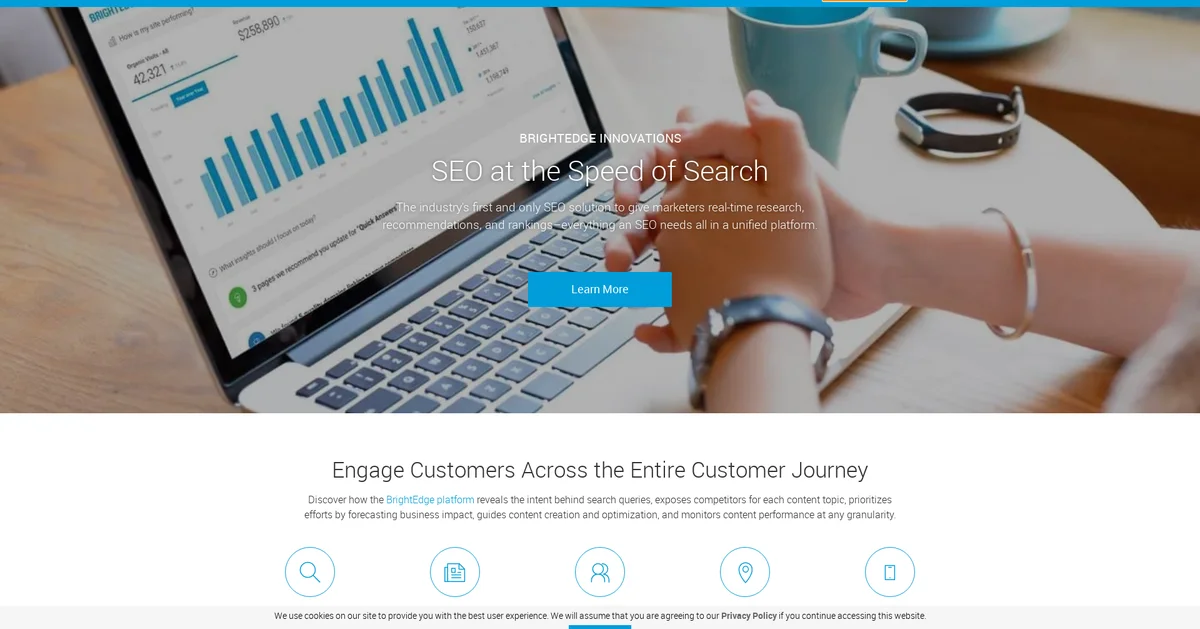
BrightEdge delivers enterprise-level SEO capabilities through its comprehensive platform, setting it apart from basic tools like Ubersuggest. While Ubersuggest specializes in keyword research and fundamental metrics, BrightEdge combines research, ranking data, and optimization tools into a single dashboard. This consolidated approach streamlines workflow for marketing teams managing complex SEO campaigns.
The platform excels at decoding search intent patterns across different queries and topics. Marketing teams can leverage these insights to shape content strategy and capture high-value traffic. Through detailed competitive analysis features, teams track market position and identify gaps in both content coverage and keyword rankings. This data-driven approach helps prioritize initiatives that generate measurable results.
BrightEdge serves multiple stakeholders across organizations - from SEO specialists diving into technical details to executives tracking performance metrics. The platform provides role-specific views and reports, delivering relevant insights based on each user’s needs. This advanced functionality represents a significant step up from entry-level tools focused mainly on keyword research.
With over 1,700 active enterprise clients and continued platform development, BrightEdge maintains its position as a leading enterprise SEO solution. Regular updates ensure marketing teams can adapt to evolving search algorithms and trends.
For organizations seeking advanced SEO capabilities and comprehensive performance tracking, BrightEdge offers a robust solution worth evaluating.
Pros
- Comprehensive real-time analytics and guidance
- In-depth competitor tracking and benchmarking
- Custom dashboards for different team roles
- Advanced search intent analysis
Cons
- Steeper learning curve for new users
- Premium pricing compared to basic SEO tools
- Substantial onboarding time required
Conductor
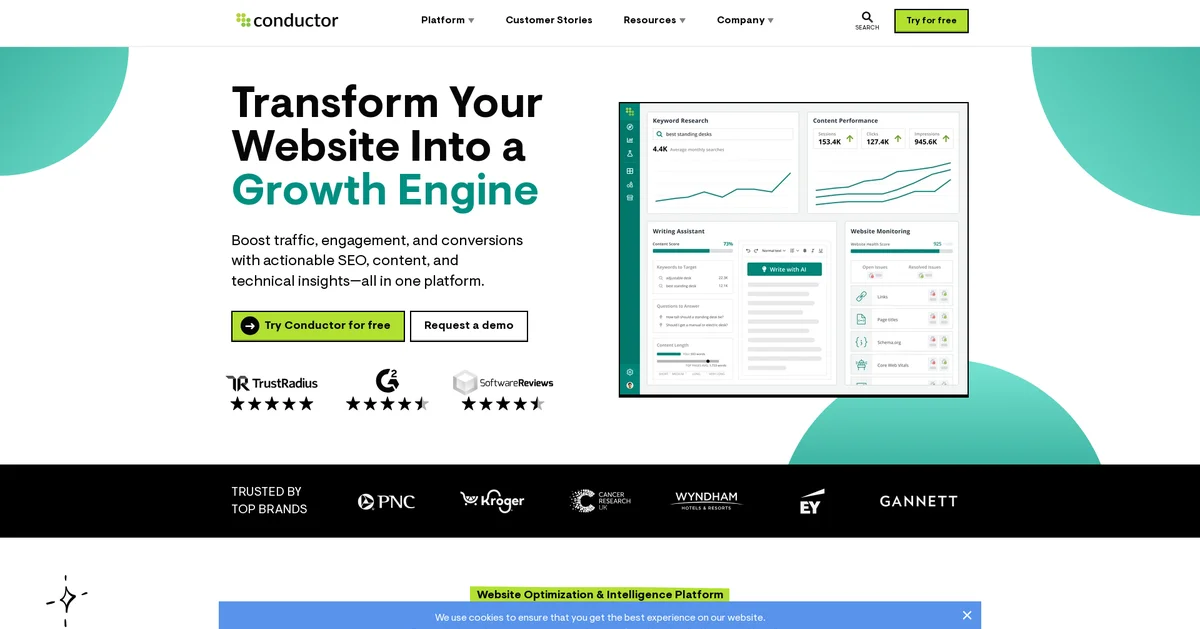
Conductor stands as an enterprise-level platform that enhances website performance through advanced SEO capabilities, content optimization, and technical monitoring. While tools like Ubersuggest focus mainly on keyword research, Conductor delivers a broader toolkit designed to drive sustained website growth. The platform particularly suits growing organizations that need robust, scalable solutions for their digital presence.
The platform’s integrated approach sets it apart in the market. By combining website optimization, content planning, and performance tracking in one central hub, teams can work more efficiently without switching between multiple tools. The addition of AI-powered content suggestions and automated workflows streamlines content creation and optimization processes, making digital marketing initiatives more manageable.
Team coordination remains central to Conductor’s design philosophy. The platform bridges gaps between SEO specialists, content creators, and developers by providing shared workspaces and tools. This unified environment helps teams align their efforts and execute marketing strategies more effectively.
Real-time website monitoring represents another key strength of the platform. The continuous performance tracking helps teams spot and address technical issues before they impact business results, maintaining consistent site performance and user experience.
For organizations seeking comprehensive digital marketing capabilities beyond basic keyword tools, Conductor delivers advanced reporting, practical insights, and strong collaborative features that support strategic growth objectives.
Pros
- Comprehensive platform integrating SEO, content, and technical tools
- Smart content suggestions powered by AI technology
- Continuous performance monitoring with quick alert system
- Improved team coordination features
Cons
- Steeper learning curve than single-purpose tools
- Premium pricing reflects enterprise positioning
- Extended onboarding period for team adoption
Advanced Web Ranking
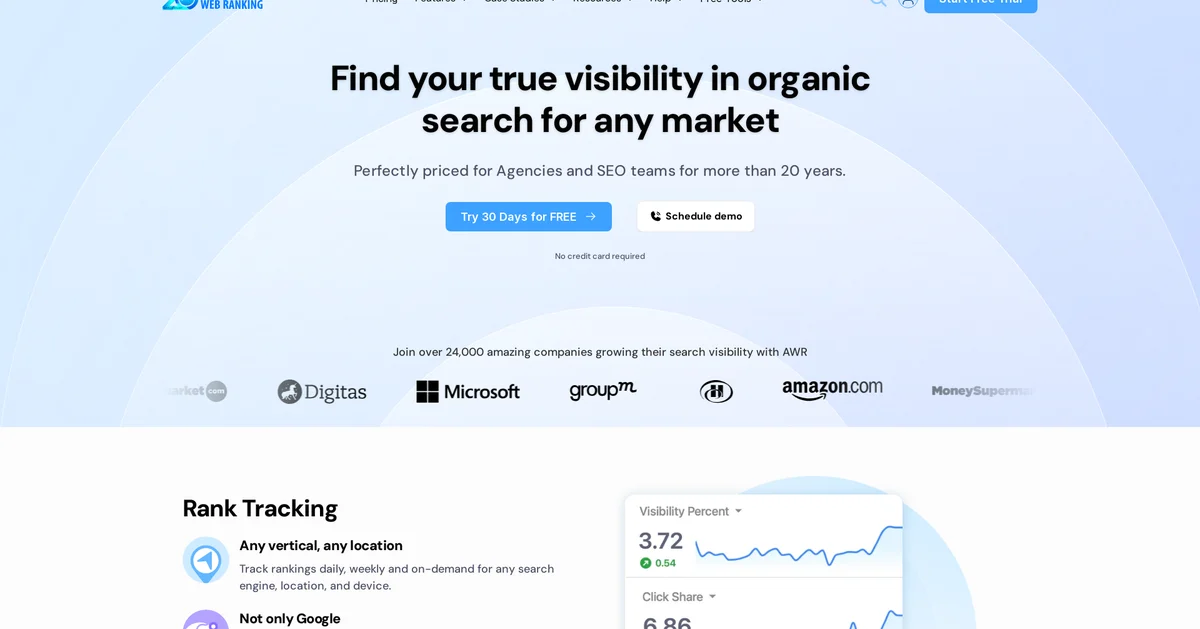
Advanced Web Ranking has established itself as a serious contender in the SEO tools market since the early 2000s. The platform caters specifically to SEO agencies and marketing departments, with robust capabilities for rank tracking, reporting, and competitive research. While tools like Ubersuggest target a broader market segment, AWR focuses on delivering enterprise-grade features for professional teams who need to monitor rankings across multiple search engines and devices.
The platform’s rank tracking capabilities set it apart from competitors. Beyond standard Google rankings, AWR monitors positions on YouTube and Amazon marketplaces to provide fuller organic visibility insights. The tool’s pixel-level tracking shows where websites appear on search results pages, giving agencies the precise data needed to demonstrate value to clients.
The competitor analysis features make AWR particularly valuable for agency work. Teams can monitor unlimited competitors at no extra cost, enabling thorough market analysis and strategy development. The reporting system supports white-label documentation, streamlining the process of sharing progress and results with clients.
AWR connects smoothly with essential platforms like Google Analytics and Bing Webmaster Tools, creating a centralized hub for SEO data analysis.
For agencies seeking a robust alternative to simpler tools like Ubersuggest, AWR delivers enterprise-level capabilities that support sophisticated SEO services.
Pros
- Deep rank tracking across search engines and marketplaces
- Pixel-precise SERP position monitoring
- Unlimited competitor tracking
- Agency-ready reporting system
- Strong platform integrations
Cons
- May exceed needs of solo marketers
- Premium pricing structure
- Steep learning curve for new users
KWFinder
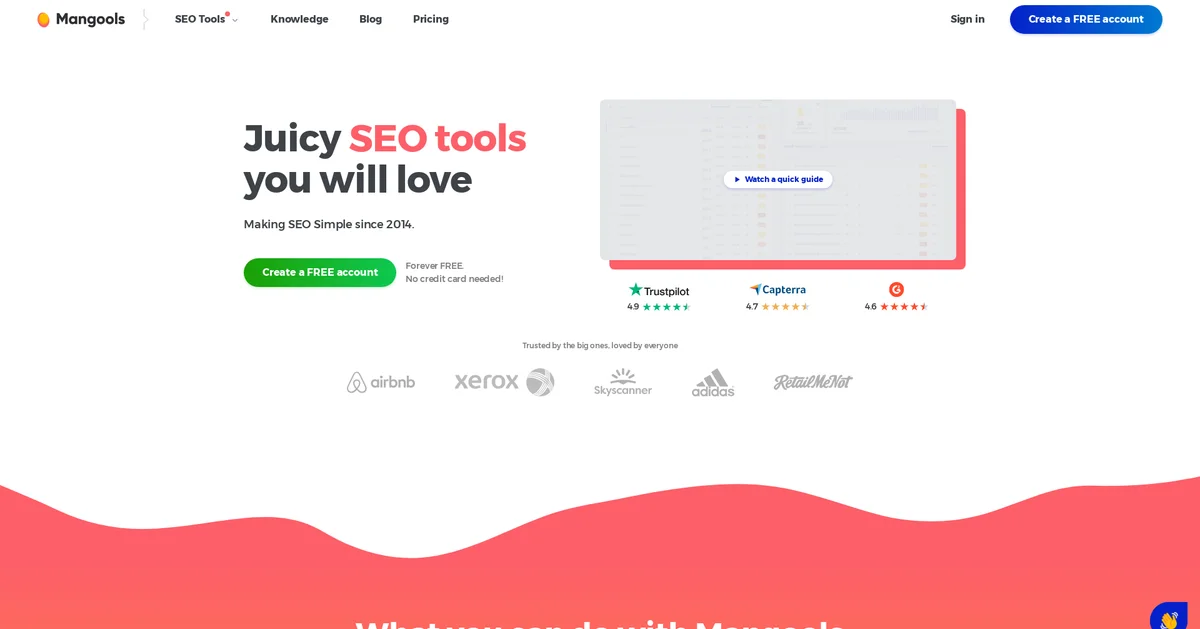
KWFinder stands out in the crowded SEO tools market by keeping things straightforward and accessible. Since 2014, this component of the Mangools toolkit has carved out its niche by prioritizing ease of use over feature bloat. The platform resonates with professionals who need reliable SEO data without getting lost in technical complexities.
The tool’s keyword difficulty scoring system delivers particularly reliable results. This practical metric helps content teams determine which search terms are worth pursuing, leading to more strategic content planning. Their tracking system monitors website performance trends, giving clear visibility into what strategies are moving the needle.
The Link Strength feature brings a fresh perspective to backlink analysis, measuring the actual impact potential of different link opportunities. Perhaps most valuable is their support team - staffed by experienced SEO practitioners who can provide relevant, practical guidance based on real-world experience.
Mangools has positioned their pricing structure to be notably competitive in the SEO tools market, making professional-grade keyword research accessible to growing businesses.
KWFinder serves as a practical alternative to Ubersuggest for teams seeking focused functionality and straightforward usability.
Pros
- Clean, intuitive interface design
- Dependable keyword competition metrics
- Expert-level support from SEO practitioners
- Cost-effective pricing options
- Practical link analysis capabilities
Cons
- More limited scope than full-service SEO platforms
- Not ideal for complex enterprise-level campaigns